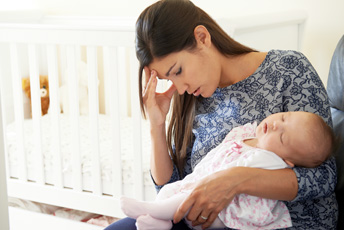Could You Have Postpartum Depression?
 From the anticipation during pregnancy to the joy when you first meet your precious new baby, new motherhood brings about so many emotions. There are high expectations from family and friends and society at large that the primary emotions should be ones of happiness, but it is not uncommon for women to experience a range of other emotions, including diagnosable depression.
From the anticipation during pregnancy to the joy when you first meet your precious new baby, new motherhood brings about so many emotions. There are high expectations from family and friends and society at large that the primary emotions should be ones of happiness, but it is not uncommon for women to experience a range of other emotions, including diagnosable depression.
More than 80 percent of all women experience some version of “the baby blues” after delivery. Thankfully for most, these feelings are short-lived and disappear on their own in a few weeks once hormones balance. However, for some new mothers, the symptoms of feeling down not only linger, but they also intensify.
What is Postpartum Depression?
Postpartum depression isn't about feeling sad or tired after giving birth. The emotions women experience vary greatly, with the most prevalent being overwhelming sadness and feeling of emptyness. It's estimated that 15 percent of new moms will develop postpartum depression.
This is a serious type of depression, as equally valid as any other form, and merits professional treatment. Some mothers find that as their hormones balance, they can recover on their own, but most need professional help to overcome postpartum depression, especially those who were prone to depression before pregnancy.
Symptoms
Postpartum depression symptoms can vary slightly from woman to woman, but there is a set list of common experiences that many mothers share. You do not have to meet every symptom on this list to be experiencing postpartum depression, but you should take note of how closely and to what intensity each one resonates with you.
- A sad, down and depressed feeling after giving birth that persists for more than a week after bringing your baby home
- Feeling anxious, restless and struggling to sleep
- Feelings of worthlessness, guilt and shame
- Difficulty eating, bathing or following through with other everyday activities
- Feelings of paranoia, marked by short periods of intense worry that makes you feel frantic and "out of control" of your emotions
- Feelings of doing harm to yourself, others, or your baby
The most important thing to remember is that postpartum depression is not your fault. The hormonal changes that take place after giving birth can trigger depression in many women, and you are not a failure as a mother or human being because of your experience. You're facing a problem caused by biological changes, and there is no shame in getting help so you can fully be there for yourself and your family.
Treatment
The first phase of treatment is accurate diagnosis. Your doctor will screen you for postpartum depression. It’s common to also order a blood panel to check your thyroid and ensure there are no underlying hormonal or physiological health problems contributing to your depression.
Once properly diagnosed, you may be referred to a licensed mental health professional. There are medications that can help with postpartum depression, but for some, it can also be treated with therapy alone. Cognitive Behavioral Therapy (CBT) is one of the most popular forms of treatment for depression. This therapeutic model helps patients identify misconceptions in their thinking patterns and change them to be more beneficial. You can also learn how to set goals, adapt to motherhood more easily and reconnect with your identity as a woman and individual. If you and your therapist do decide to try antidepressants, there are several types that can be taken safely while breastfeeding.
When to Get Help
If you think you might be suffering from postpartum depression or have been recently diagnosed, talk with your ObGyn to learn the best way to manage your symptoms. Seeking help does not mean you are weak or have failed as a mother. In fact, it indicates the opposite. Many women struggle with depression in secret for too long.
If you would like to discuss postpartum depression more, please contact us today! Call Kansas City ObGyn at (913) 225-8567 or email us at This email address is being protected from spambots. You need JavaScript enabled to view it..
Dr. Crystal M. Newby, MD is a physician at Kansas City ObGyn. She received her medical degree from the University of Missouri - Kansas City School of Medicine. Dr. Newby married her fellow Kansas native high school sweetheart and they have 3 daughters.






